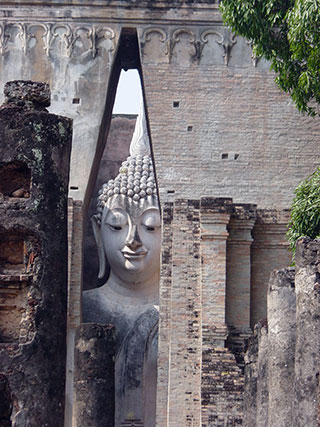 Theravada Buddhists regard their doctrine to be the original teachings of Buddha. Their Arhat ideal states that disciples must isolate themselves from the distractions of the world and "...with prodigious concentration, [proceed] unswervingly toward that goal" of nirvana. (Smith 124) In this sense, Theravada Buddhism is selfish because Arhats focus mainly on their own salvation, and not on others'. An Arhat is literally one who has conquered all "lust, hatred, and delusion..." (Lester in Earhart 964) and has freed himself from the cycle of desire, suffering, and rebirth, patiently awaiting nirvana.
Theravada Buddhists regard their doctrine to be the original teachings of Buddha. Their Arhat ideal states that disciples must isolate themselves from the distractions of the world and "...with prodigious concentration, [proceed] unswervingly toward that goal" of nirvana. (Smith 124) In this sense, Theravada Buddhism is selfish because Arhats focus mainly on their own salvation, and not on others'. An Arhat is literally one who has conquered all "lust, hatred, and delusion..." (Lester in Earhart 964) and has freed himself from the cycle of desire, suffering, and rebirth, patiently awaiting nirvana.
Seekers on the path to nirvana are fundamentally on their own as Theravada Buddhism excludes most forms of prayer, ritual, and worship. In fact, aspects one would typically regard as religious are absent from this branch of Buddhism. Deities and gods are either downplayed, or ignored altogether. For instance, Theravada expert Ven. Dr. H. Saddhatissa states that "...Buddhism does not recognize a Creator God but rather states that we are the architects of our own destinies." (35) They are taught not to rely on the grace of God/gods, by rather on the solitary efforts they make toward nirvana.
Mahayana (literally "big raft") is the evolution of Buddhism as a religion. Whereas the Buddha renounced the trappings of Hinduism and its countless and confusing gods and rituals, Mahayana Buddhism restored ritual, prayer, and acknowledgment of deities. (Smith 126) Some offshoots of Mahayana (including Westernized derivations) even make direct references to "God" and "heaven" and underscore the evolution of doctrine within Buddhism.
Mahayana cherishes the bodhisattva, the "being striving for enlightenment." (Lester in Earhart 879) The bodhisattva can be characterized as one who denies self-interest (879) and refuses nirvana for the sake of helping others achieve it. The selfless bodhisattva does not proselytize for Buddhism, but rather stores up good karma for others to use. (Lester in Earhart 881) Bodhisattvas can be called upon in prayer by lay Buddhists — a ritual dimension not unlike the Christian concept of sainthood.
Related articles
- Comparison of Eastern Faiths: Buddhism, Hinduism, Taoism, Confucianism, Shinto
- Bhakti: Hinduism's devotion to a personal God
- Baraka: We are in perpetual need of grace
Works Cited
Saddhatissa Mahanayake Thera, Ven. Dr. Hammalawa. An Introduction to Buddhism. Centerreach, NY: The Council of Thai Bhikkhus in the USA, n.d.
Lester, Robert C. "Buddhism: the Path to Nirvana"  Religious Traditions of the World: A Journey Through Africa, Mesoamerica, North America, Judaism, Christianity, Islam, Hinduism, Buddhism, China, and Japan. Ed. H. Byron Earhart. New York: HarperCollins, 1993.
Religious Traditions of the World: A Journey Through Africa, Mesoamerica, North America, Judaism, Christianity, Islam, Hinduism, Buddhism, China, and Japan. Ed. H. Byron Earhart. New York: HarperCollins, 1993.
Smith, Huston.  The World's Religions. New York: HarperCollins, 1991.
The World's Religions. New York: HarperCollins, 1991.